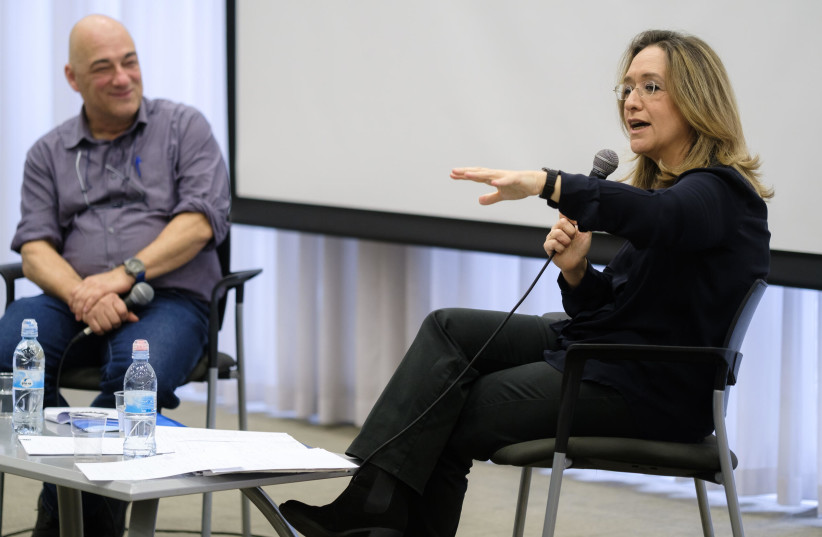Will Israeli journalists need to change how they report the news? – study
Journalists around the world are today expected to learn new skills such as data and multimedia journalism, just as many decades ago they had to move from typewriters to computers. However, the extent to which new skills are expected for its core activity – news reporting – remains disputed.
Now, research by Prof. Zvi Reich of Ben-Gurion University of the Negev (BGU) in Beersheba and Oded Jackman of the Open University have published a study on the subject in the International Journal of Communications entitled “The Journalistic wish-list: Exploring reporters’ desired skills using Delphi method.” This method refers to a forecasting process and structured communication framework based on the results of multiple series of questionnaires sent to a panel of experts.
To allow ego-free and anonymous negotiations of reporters’ desired skills, they organized a Delphi panel of news executives and specialists. Their panel consisted of 31 experts, 20 endogenous (from inside the profession) and 11 exogenous (from outside), using three rounds of questions.
What are reporters required to know?
The findings showed that reporters are expected to prioritize traditional skills – be knowledgeable about their beat, think critically about raw materials, and be quick but accurate. However, they are expected to utilize databases and prioritize story detection over storytelling. These skills enable journalists to identify newsworthy stories, recruit sources, explore databases, use interview techniques, expose corruption, and construct coherent and attractive stories.
“So far, the new skills have appeared mainly in new journalistic activities, including multimedia storytelling, data journalism, and social media editing. However, the extent to which they infiltrate the traditional core of journalism, news reporting, remains unclear, hardly explored, and disputed between the two main camps of scholars, they wrote.
 Prof. Zvi Reich (left) with TV journalist Dr. Ilana Dayan (credit: DANI MACHLIS/BGU)
Prof. Zvi Reich (left) with TV journalist Dr. Ilana Dayan (credit: DANI MACHLIS/BGU)“New skills, according to this camp, will inoculate journalists against trends of de-skilling, following pressures of commercialization, rising audience participation, and increasing delegation of news assignments to algorithms,” they wrote. “According to the more traditionalist camp of scholars, the future of news reporting depends on its capacity to rediscover and maintain traditional skills. These scholars do not deny transformative changes, such as the acceleration of reporting cycles, but maintain that journalistic skills change and should change much slower.”
Working as a journalist has always demanded working fast. Looking into the question of whether technology-related skills are more appreciated today than traditional newsgathering skills, they wrote that “in digital environments, the time lag between events and their reporting is often compressed to almost real-time reporting. This acceleration increases the tension between time-related skills, such as immediacy and availability, and quality-related skills, such as accuracy and the provision of context.”
Some authors in the past have written that reporting news quickly was ranked lower by journalists compared with previous studies because of their “ambivalent attitude” toward speed. After all, some of the most serious forms of journalism, for example, investigative reporting, long-form, and magazine writing, have a record of slow-moving work. Time matters to different occupations that must act quickly without a chance to correct mistakes on the go. Under such circumstances, other than “crude skills” practitioners must develop “subtle skills.”
The reporter’s role has shifted from mere stenography of information to interpretation and sense-making. The shift toward interpretation was described as a response to the emergence of real-time and around-the-clock television reporting during the 1980s and online coverage during the mid-1990s, which generated a stream of unedited raw information. These trends encouraged the rise of news skills that combined information, interpretation, and opinion-based articles, and interpretation and analysis were ranked higher among news reporters compared with neutral reporting.
Beat specialists are assigned to cover more beats, and generalists and freelancers are expected to cover areas once covered by regular beat reporters. Fewer specialized reporters raise expectations for more general knowledge, they wrote, and generalism is seen as a journalistic asset valued by editors, enabling versatile coverage of various topics. “But generalism comes at a price – growing dependence on expert sources … in areas such as sports, art, business, and even sciences. Are news reporters expected to prioritize generalist knowledge over specialized beat knowledge?… More than mere collectors of facts, they are expected to mold the relevant facts into stories to portray, describe, narrate, make claims, and “tell stories of consequence.”
Furthermore, reporters are expected to augment their storytelling with new tools, such as data visualizations and interactive. While rewriting desks can repair the imperfections of storytelling, they can do nothing if stories are not detected in the first place. News detection is a skill in itself, described as involving reporters’ body organs, such as “nose for news” or ‘‘gut feeling.” Reporters today have numerous ways to augment news detection.
Most news outlets are privately owned, competitive, and technologically updated, similar to other modern Western press. However, the authors concluded, the Israeli media map is highly concentrated in terms of geography and ownership. Panelists cannot be dismissed as unusually conservative, since they were too senior, diverse, visionary, and updated about the current and future realities of the news industry.
They suggested that others replicate their study in the future to detect whether the desired reporters’ skills are still largely resistant to change in other news cultures. “They might also focus on specific niches of news work, such as commentators, data journalists, general assignment reporters, social media curators, investigative reporters, columnists, and citizen journalists, who might substantially diverge in their desired skills.”





Comments are closed.